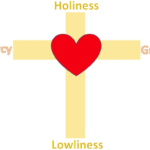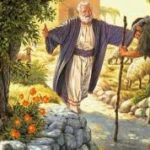In the beginning was the Word, and the Word was with God, and the Word was God...And the Word became flesh and dwelt among us, and we have seen his glory, glory as of the only Son from the Father, full of grace and truth. John 1:1,14 It was the moment that all of Creation had been racing toward since our Creator first spoke … [Read more...] about The Word Became Flesh
New Testament
The Message of the Cross
For the word [message] of the cross is folly to those who are perishing, but to us who are being saved it is the power of God.1 Corinthians 1:18 In today's world we are inundated with religious imagery, but all meaning seems to be lost in presentation. And no imagery is more powerful, yet so misrepresented as the image of … [Read more...] about The Message of the Cross
The Other Brother
“Now his older son was in the field, and as he came and drew near to the house, he heard music and dancing. And he called one of the servants and asked what these things meant. And he said to him, ‘Your brother has come, and your father has killed the fattened calf, because he has received him back safe and sound.’But he was angry and refused to go in. His father came out and … [Read more...] about The Other Brother
A New Creation: Separation
And God saw that the light was good. And God separated the light from the darkness....And God said, “Let there be an expanse in the midst of the waters, and let it separate the waters from the waters.” And God made the expanse and separated the waters that were under the expanse from the waters that were above the expanse. And it was so.Genesis 1:4, 6, 7 Growing up in a … [Read more...] about A New Creation: Separation
A New Creation
Therefore if any man is in Christ, he is a new creation; the old things passed away; behold, new things have come. 1 Corinthians 5:17 The very first thing that the Scriptures declare is that the overarching theme of the library of the Bible is that God is. The very first thing that the Scriptures declare as the activity of God is that He creates. The overarching theme of … [Read more...] about A New Creation




